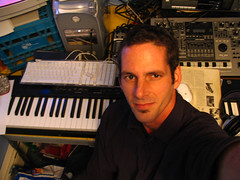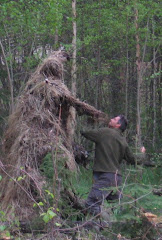So I'm reading geof's pick and I stumble across channel decorrelation. (pp. 84, hack #26) This is a sensory technique that prefers independent data over correlated data. Its the reason why (in addition to neuron fatigue) we ignore so much sensory information because constant levels of input only provide correlation (or indicate perhaps that something is wrong much like a silent watch with no minute hand-difficult to know if it works!)
Anyway, it inspired a couple of thoughts:
1 if the brain has adapted to operate under rule 1: ignore constant sensory data because it doesn't provide independent data; then the following conundrum exists. Our macro nature tends toward constancy and predictability, (for obvious evolutionary reasons) yet brain adaptation suggests that this is not the best way for gathering information. I'm making a leap from micro to macro here but I think the statement is intuitive. If through our experiences we learn about our nature, then limiting our experiences through constancy causes an inner channel correlation, which leads nowhere. This perhaps obvious thought though lead me to a better thought:
2 an interesting program would be to take advantage of all the techniques of brain adaptation and evolution and apply them at the macro level in one's day to day life.
As I read further through the Stafford and Webb book, I will think about this and perhaps sketch out a small program.

Wednesday, March 30, 2005
Tuesday, March 29, 2005
inteli-what?
I was having a conversation the other day when the opportunity to embark on a conversation gambit arose. When challenged to define intelligence, I thought that in light of Jaynes, Dennet, et. al; there was a reason that intelligence was so hard to define. The reason is that there is no such thing. What passes for the catch-all word intelligence, is really just a set of skills, all of which are learned unconsciously. I thought that it was the facade of the Cartesian Theater that propagated the notion of a 'homunculus' driven intelligence that directs and manages the 'skills'. As I further explored this gambit I became further convinced that there is no 'skill manager' that we ambitiously call intelligence.
So the next iteration of the problem of course is to quantize the homunculus into skills. This is where the work lies. It seemed at first glance that a large part of what we call intelligence, or at least the part that is most visible, is merely oral or written skills (enter Dr. Jaynes.) The next largest part is merely the rate at which one acquires skills. This last portion seems to me to be where an interesting discussion can flourish. Additionally, there are interesting grey areas of abstract problem solving where identifying an unconscious skill becomes occluded.
Questions and comments are most welcome. Paradoxes illuminated or revealed shall also be considered.
So the next iteration of the problem of course is to quantize the homunculus into skills. This is where the work lies. It seemed at first glance that a large part of what we call intelligence, or at least the part that is most visible, is merely oral or written skills (enter Dr. Jaynes.) The next largest part is merely the rate at which one acquires skills. This last portion seems to me to be where an interesting discussion can flourish. Additionally, there are interesting grey areas of abstract problem solving where identifying an unconscious skill becomes occluded.
Questions and comments are most welcome. Paradoxes illuminated or revealed shall also be considered.
Subscribe to:
Comments (Atom)


